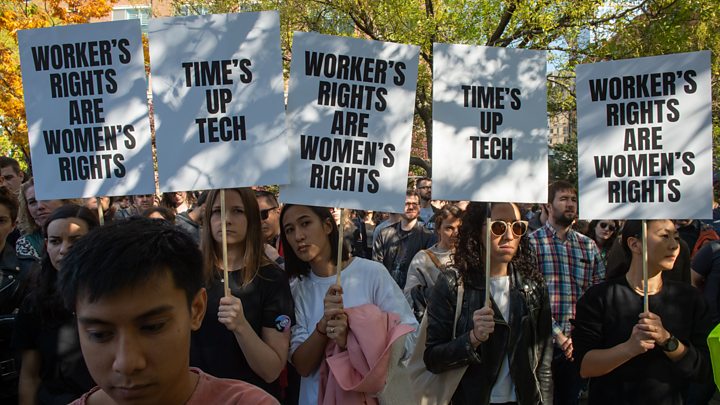Harassment Victims at Google Gain More Power.
Google employees will now be able to more freely speak out over issues of sexual harassment at the firm.
Responding to demands from the around 20,000 workers who protested last week, the company has said it will end the practice of "forced arbitration" in cases of sexual harassment.
Arbitration will now be optional, chief executive Sundar Pichai said in an all-staff email.
The company did not, however, respond to employees' demands in other major areas of concern, angering campaigners.
Most notably, it did not comment on calls for Google's board to have an employee representative, and for the company's chief diversity officer to report directly to the chief executive.
'Sincerely sorry'
In an email to staff on Thursday, Mr. Pichai said: "Over the past few weeks Google's leaders and I have heard your feedback and have been moved by the stories you've shared.
"We recognize that we have not always gotten everything right in the past and we are sincerely sorry for that. It's clear we need to make some changes."
The measures, Mr. Pichai said, will increase transparency around instances of sexual harassment, expand mandatory training, and offer increased support for those with claims.

Most impactful will be a shift away from forced arbitration, a highly-criticized practice that meant employees were contractually-bound to deal with complaints internally, in what some legal observers have described as being a "private justice system".
"We will make arbitration optional for individual sexual harassment and sexual assault claims," Mr. Pichai wrote.
"Google has never required confidentiality in the arbitration process and arbitration still may be the best path for a number of reasons (eg personal privacy) but, we recognize that choice should be up to you."
'Caste-like system'
But the Tech Workers Coalition, which backed last week's action, said the measures did not go nearly far enough, particularly where it related to contractors who worked with the firm.
"Sundar ignored the demand for a worker to be represented on the board and [temps, vendors, and contractors (TVCs)] continue to have no adequate protection from sexual harassment, who makeup over half the Google workforce and are disproportionately women and people of color.
"TVCs didn't receive this email this morning and have been excluded from the town hall. This deliberate sleight demonstrates the caste-like system deployed by Google, which fails to protect its workers and our colleagues."
The spokesperson added: "For a company that likes to innovate, it's striking to see such a lack of vision for treating all of their workforces with basic dignity. We take inspiration from all who work at Google to keep fighting to build worker power."
Campaigners hope the promised overhaul of how Google handles issues around sexual harassment will remove a culture of secrecy that saw one high-profile engineer leave the company with a $90m payout, despite "credible" claims of inappropriate behavior.
The company later said that over the past two years, 48 other employees - including 13 considered to be senior staff - had been fired over sexual harassment issues.
More widely, Google's move to end forced arbitration for sexual harassment claims may energize employees at other firms to demand the same. Uber and Microsoft had already dropped the practice.
Labels:
TECH NEWS




.jpeg)


.jpeg)
.jpeg)




.jpeg)

No comments: